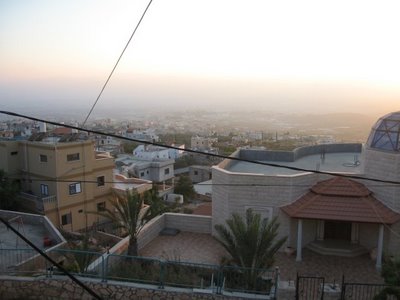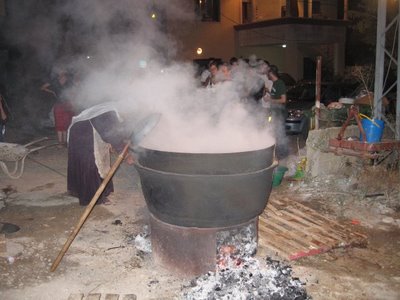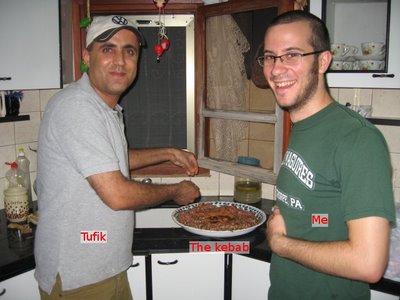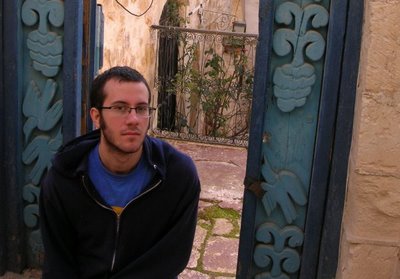Life in Israel
For those of you have escaped my mother's constant bragging about what her sons do: first, congratulations; second, I've spent the last year in Haifa, studying computer science at the Technion.
The truth of the matter is that the place doesn't suit me. I learned a lot, but if I could change the past, I would have spent only the spring semester here. Part of the problem is that I don't much get along with the Jewish Israelis. Apart from other exchange students, my best friends are Druze.
I visited Daliat al'Carmel, the biggest Druze settlement in Israel, before I met Camli and her boyfriend Walid. It's famous as a center for shopping and cuisine. I went back with Camli, meeting her parents and exploring more of the town itself. (They call it a village, but with around twenty thousand people it's no village.) Three weeks ago, Walid had a huge birthday party. I was supposed to be שר הבשר "the minister of the meat", but Walid's uncle Tufik totally outclassed me on the grill. Nevertheless, we got along fabulously, and Walid eventually suggested visiting his hometown, Yarca, to see his home, family, and Tufik. Who can pass up an offer like that?
So last Thursday we followed through: I went with Walid to Yarca, with most of the other exchange students tagging along. The town is northeast of Akko, and it wasn't a long drive. The first stop was Kfar Yasif, a Muslim and Christian Arab town on the way to Yarca. The first agendum was a "nargilly", as Benjamin Disraeli would call it. Afterwards, we were hungry -- I hadn't eaten all day. Walid knew a place nearby, Lebanese shawarma. Oh man, it was good. We watched them bake the lafas (large, flat, pocketless pitas) and slice off the juicy, juicy meat.
 Gilad and Yaniv look much more normal when they're not chewing, I assure you. But Bas always looks like that. Gilad has been one of my best friends here in Haifa; we've shared an apartment since September. Yaniv came in March; his English fluency (and company) have been another component of my happiness.
Gilad and Yaniv look much more normal when they're not chewing, I assure you. But Bas always looks like that. Gilad has been one of my best friends here in Haifa; we've shared an apartment since September. Yaniv came in March; his English fluency (and company) have been another component of my happiness.After stopping off at a few churches in Kfar Yasif, at which we were the subject of considerable wonder, we headed over to Yarca. Coffee at a friend's house -- the door was open, why not walk in? Another cup of coffee! A quick aside: why is Arab coffee so good? (Hint: that's a rhetorical question, and I'm about to tell you.) Because they put crushed cardamom pods in it, making it קפה נחלי "cafe nahli" rather than just coffee beans. I don't think I'll ever go back: cardomom forever.
Awakened from our collective food coma, we headed to Walid's house. It wasn't just a house, but a complex: an older home belonging to his grandparents and parents and another, bigger one for his uncle; floors intertwined, each occupied by one of the six brothers in Walid's generation. Parts had an unfinished patina -- most people take part in the construction of their own homes, I was told, and the temptation to stop at "good enough" must be great -- but the interiors were beautifully decorated. I haven't seen many nicer dining or living rooms. Depressingly, much of it seems rarely used, if ever. I wonder how much they could have saved if they didn't feel the need to display such fine things. My favorite part of their house, other than the grape-vine trellised porch, the pomegranate tree, the expansive herb garden, and the heirloom plum tree -- was the view.
 Unfortunately, it was a bit too hazy to take good pictures. But trust me, you could see to Haifa, to Rosh ha'Niqra, and further on into Lebanon. You can see the sea at the edge, under the cloudy glare. (The pollution got worse through the night; the moon changed colors from bright white to deep orange.)
Unfortunately, it was a bit too hazy to take good pictures. But trust me, you could see to Haifa, to Rosh ha'Niqra, and further on into Lebanon. You can see the sea at the edge, under the cloudy glare. (The pollution got worse through the night; the moon changed colors from bright white to deep orange.)We drank another cup of coffee, watching the sunset, dutifully smoking another "narguillet". I tasted the sweetest watermelon I've ever had, along with some cherries and the sour, unripe grapes that hung above us. The watermelon wasn't local to the village but is rather a testament to the quality of Israel's fruit produce.
Once it was quite dark, we got a phone call from Tufik -- it was time to head over for the מנגל "barbecue". We got in the cars, Walid taking his father's cab instead of his vintage 1973 VW Bug. (Unfortunately, I only have interior pictures; it's a really great car.) I was surprised to pull up to a huge group of women and a fantastically steaming pot. We weren't going to Tufik's yet; first we had to see the burghul. Walid had been talking about it all day, but I still didn't have a good image. Here's a good image:
 You may be asking what burghul is. Go ahead: "What's burghul?", you ask? Burghul is bulgur: boiled wheatberries. It's eaten throughout the Middle East, where it's generally called burghul; it's 'bulgur' only in Turkish. We got out of the cars to an immediate offer of juice from Tufik's wife, which is of course not to be declined. She proceeded to translate for me as I asked one of the women working the pot how much wheat is in there (150 kilos) and how long you boil it (about two and a half hours). (She was amused when I understood only some of the numbers in Arabic. "Two hours?" I said. "No, no, two and a half," she corrected. Presumptuous Jews with their newfangled language...)
You may be asking what burghul is. Go ahead: "What's burghul?", you ask? Burghul is bulgur: boiled wheatberries. It's eaten throughout the Middle East, where it's generally called burghul; it's 'bulgur' only in Turkish. We got out of the cars to an immediate offer of juice from Tufik's wife, which is of course not to be declined. She proceeded to translate for me as I asked one of the women working the pot how much wheat is in there (150 kilos) and how long you boil it (about two and a half hours). (She was amused when I understood only some of the numbers in Arabic. "Two hours?" I said. "No, no, two and a half," she corrected. Presumptuous Jews with their newfangled language...)The beautiful thing about the bulghur is that it was a neighborhood effort. On an errand for more pita later on, we drove by other corners of Yarca boiling their own wheatberries. Each little section of town boils a couple of "units" (70 kilos, which can be bought for about 50 or 60 shekels) of wheatberries to share; everyone gets together to do it, helping to build the fire, arrange the pot, and fill it with the wheat. After boiling, the group goes from house to house, pulleying the boiled wheat up to be spread across the flat roofs, were the sun dries it. Once burghul is fully dry, it's ready for kibbeh (a burghul and lamb pastry) or tabouleh (crushed burghul mixed with tomatoes, cucumbers, parsley, mint, and lemon).
The neighborly feeling is remarkable; it's very satisfying to see people working together for their food. Walid and I talked about it later. He appreciated it not only because it was delicious and neighborly, but because it's so local, so unglobalized. I have to agree.
After tasting the fresh burghul plain and with sugar (delicious either way, like a less nutty quinoa), we finally headed over to Tufik's place. It was similar to Walid's family's house, only smaller -- it was built more recently, and lacks the twisty passages caused by iterative expansions. It, too, had a beautiful interior with unfinished edges and a tendency towards ostentation. One thing was different: their kitchen was clearly used and loved. That night was no exception, of course. Tufik set me about as his sous chef -- something I'm sure my girlfriend Beth appreciates on a very deep level, as well as my flatmates.
The meal consisted of a few things: kebabs, which are meat patties; shish kebabs, which is meat on a stick; and an overflowing plethora of salads. The kebab was made at Tufik's place, being a mix of lamb, beef, and turkey. The shish kebabs came from Walid's mother: chicken and a few lamb. The vegetable salads -- tabouleh and a cabbage salad -- were made in the kitchen, but the hummus, tehina, and labneh (thickened yogurt) were purchased. And, of course, before we even started to cook -- a cup of coffee.
Tufik and I were mostly on kebab duty. Which meant I was mostly on chopping parsley and holding things for Tufik duty.
 Good kebab. He uses his own spice mix, also grating in onion, hot pepper, and tomato. He thought my suggestion of adding an egg to help it stick together was heresy, but I secretly hope he'll try it sometime -- I think it'll round them out. He did fine without it, certainly, since he used a grill basket. A good idea for burgers, I think.
Good kebab. He uses his own spice mix, also grating in onion, hot pepper, and tomato. He thought my suggestion of adding an egg to help it stick together was heresy, but I secretly hope he'll try it sometime -- I think it'll round them out. He did fine without it, certainly, since he used a grill basket. A good idea for burgers, I think.That was our night. Tufik's younger daughter (perhaps seven years old?) showed me her school grades; everything was mumtaz, excellent. I duly flattered her, calling her "Mumtaz" the rest of the evening. We talked with Walid, with Tufik, with a few friends from the neighborhood, extended family. It was surprisingly free of the senseless language and culture talk that usually goes on; we talked about food, about the World Cup (auf gehts Deutschland!), about music.
We stayed late, until around 1:30am, when Gilad had to go pick up his mother from the airport. Yaniv and I rode back in the Bug with Walid, taking a detour through the Akko harbor. Perhaps not the safest place to go at 2am, but it was beautiful.
Yarca will remain one of my fondest memories of Israel; for me, it is a kernel, a condensation of its country -- a distillation of the best and the worst, of the whole.


1 Comments:
I really like these articles ,and they are all interesting .I am just going to traslate them into my language and introduce some highlights to my friends !
Post a Comment
<< Home